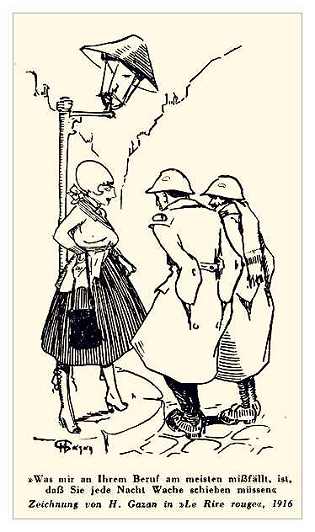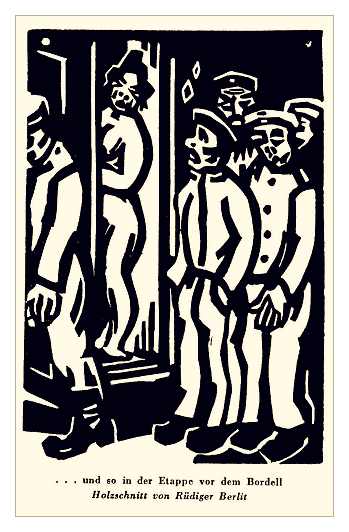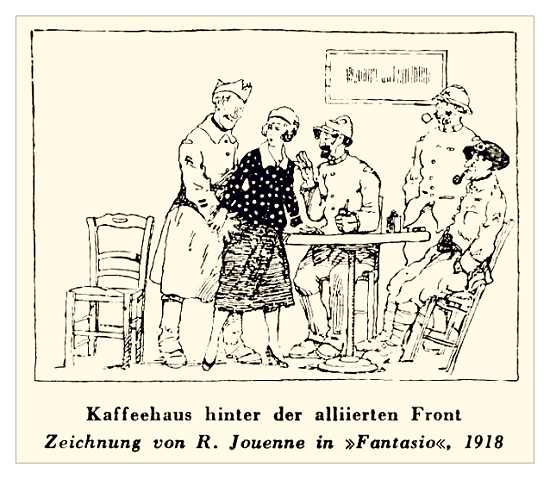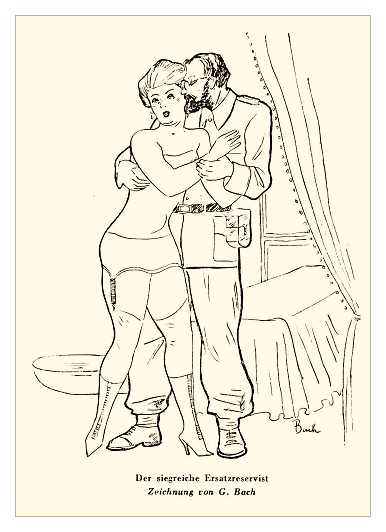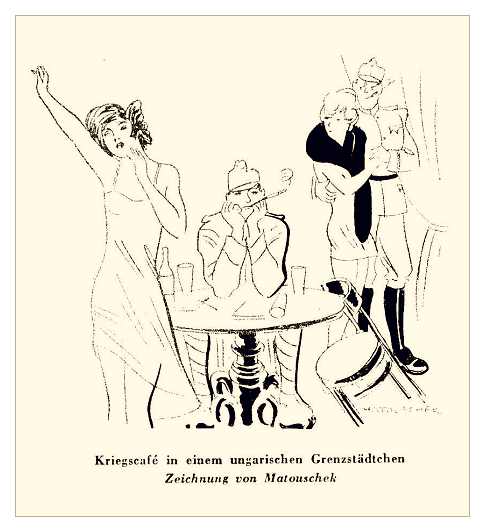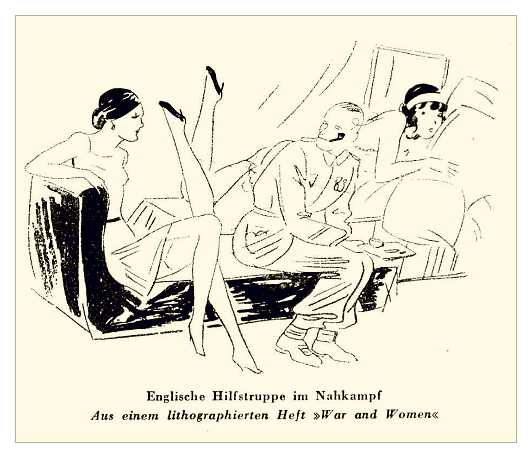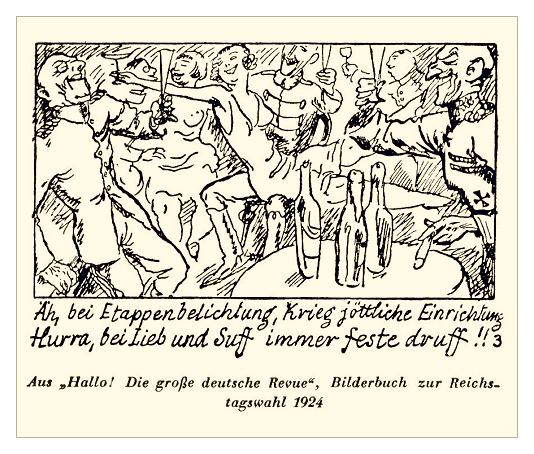from the book
Sexual History of the World War
by Magnus Hirschfeld 1930
Chapter 8
REGULATION OF ARMY BROTHELS
Close Connection Between Military and Prostitution - Prostitution in Medieval and Modern War - Assignment of Soldiers to Prostitutes - Regulation of Field Brothels - Public Houses of the Halting Places - Three Classes of Rouses-of-Joy - Etape Brothels - Degrading Line-up - Rioting in Brothels - The Bethune Bordel - Prostitute Life in Ghent - "For Officers Only" - Lille and its Loose Morality - Brothel Experiences at Havremont - Rules and Regulations for Army Brothels - A Libidinous Customer - Mad Scenes in Officers' Brothel - Modes of Recruiting Women for Bordels - Compulsory Brothel Service - Continuous Supply of Female Flesh - Misery of Common Whores
The close connection subsisting between the military and the realm of prostitutes is well known from history and has been treated in many works. This problem found detailed and illuminating treatment at the beginning of the World War in a work by Haberling. The World War did not offer any essential novelty in this matter, but it did differ from all previous wars of history in two essential points. First, as a result of national conscription, the majority of the male population of the European nations were torn out of their normal relationships and became potential victims of war prostitution. Secondly, the World War was the first conflict in which trench warfare (what the Germans call Stellungskrieg) first achieved outstanding strategic importance and, as a result, changed the conditions under which prostitution could be controlled in the army. Whereas in former military campaigns, especially during the Middle Ages, prostitutes followed the army and actually constituted a portion of the troops, trench warfare, which entalled the sojourning of large military units at the front or at various intermediate stations, required a correspondingly sedentary or fixed form of prostitution. This form could only be found in brothelized prostitution. This had the added advantage of promising some protection agalnst venereal disease and the possible interference with fighting power induced by the latter.
At the beginning of the war, the duration and extent of which was everywhere underestimated, voices were heard demanding sexual abstinence for the troops in the fields in the interest of warfare. Especially did this scientific debate, for and against the prohibition of sexual intercourse for combatant soldiers, rage in Germany. Haberling was the first to demand that soldiers be informed that they would be less subject to venereal infection if they consorted only with prostitutes who had a medical card. The famous sex hygienist, A. Blaschko, who advocated the complete abolition of prostitution at home and in the field, regarded Haberling's proposition as dangerous, because it actually suggested to the soldiers that they have intercourse with professional harlots; and he emphatically denied that the medical card constituted sufficient protection against venereal infection.
Already in November, 1914, numerous voices arose, especially from the side of the physicians who specialized in these matters, demanding the widest possible prohibition of sexual intercourse to soldiers. At a meeting of war physicians held at Lille, Professor Flesch of Frankfurt counselled, among other things, sexual continence as obligatory for the whole field army-soldiers and officers alike-for the duration of the campaign, and the closing of all brothels, taverns, etc., at places where field troops are quartered. It was the opinion of another military physician, Dr. Kurt Mendel, that the best way of preventing venereal disease was by demanding complete continence of those who stood in the field; and he regarded this abstinence as being not impossible in view of the fact that war demanded so many great personal sacrifices which the soldier was always willing to suffer. He believed that the personnel of the army would willingly abstain from consorting with prostitutes when it realized that the matter concerned their personal welfare-that venereally diseased soldiers would be unfit for fighting for many weeks, that, even after recovery from the primary stages of the disease, there might ensue grave consequences which every war has brought in its wake such as tabes and paresis, and that even their own women might become infected. Professors Kuhn and Moeller wrote an article in which they attacked the whole institution of brothels and pointed out that these establishments were dangerous, even though an effort was made to keep sick women out of them through periodic physical examinations. They proved that it was impracticable, even in a town of 15,000 inhabitants, for almost every regiment that stopped there and patronized the houses of joy suffered a marked increase in venereal infection. As a result even the supervised brothels had to be shut after a short time. Furthermore, these two students pointed out, the whole institution of brothels carried with it a great moral danger. Since the soldiers were assigned to intercourse with prostitutes they actually got the feeling that extra-marital intercourse was quite permissible for married soldiers. For this reason Kuhn and Moeller felt that complete sexual continence should be demanded for the whole period of the war.
In other lands too, the question of prostitution in the army was also discussed, but nowhere with the thoroughness that the Germans manifested in their analysis of the question or in their regulation of the evil. But, despite all the talk, it appeared that, so far as the army was concerned in Germany and elsewhere, the question was decided from the very beginning. In military circles the prohibition of sexual intercourse was not taken seriously, not so much because it contradicted the normal sentiment, as that it ran counter to military tradition. As against all the arguments adduced by scientists, the military authorities insisted that such a prohibition ran counter to the attitude of the soldier.
That is the reason why we find at the beginning of 1915, when the war of invasion had already turned into a protracted trench war, that both sides were well provided with military brothels all along the line of battle. They were first introduced in the West and shortly afterward at all points on the Eastern front. These field brothels, which were found at some slight distance from the line of battle, were housed in abandoned castles, in little village houses which had been more or less spared by the war, in wooden barracks which had been erected for this purpose, or in empty wagons. Usually they lasted only a short while and the personnel did not exceed three. They were patronized by soldiers who were on the line of battle or were returning thence to the second line or reserve.
More important were the public houses at the halting places in the war sector or what the French call étape, which were erected for a long period and which, in some cases, had been established and used by the civil population even earlier. This station was not exposed to the direct danger of war and served as a sort of center for all portions of the army who were being sent to the front or who were being brought back after all sorts of abstinences, including sexual ones. It is interesting to note that in these institutions differences of rank were definitely observed. Everywhere there existed a sharp differentiation between the brothels reserved for officers and those assigned to the common soldiers. As a matter of fact, there were three classes of houses of joy-the highest for the officers, intermediate ones for non-commissioned officers, and the third for common soldiers. On the Western front there were well-appointed étape brothels for the troops of the Allied armies at various points behind the firing lines. These houses were always marked by a blue lantern if they served officers, and by a red one if they served common soldiers. The inmates were almost exclusively French women who had either lived here before the war or had come as fugitives from districts occupied by the Germans. The patrons were recruited, aside from those contributed by the French army, from officers and soldiers of the other Allied forces, particularly Englishmen.
As a result of the negligence with which the French military physicians treated the whole matter of venereal disease, these French étape brothels became veritable breeding places of venereal disease for the English soldiers who had gotten very little instruction in these matters. In his stirring war-book, Good-bye to All That, Robert Graves has reported such a case. One night a young Welshman, who shared Graves' tent, came home considerably stewed and amazingly happy. It appeared that the lad, who was the son of rigidly. moral parents, had never had any contact with women, and had never been told anything at all about precautionary measures to prevent venereal disease. He had just had intercourse with a prostitute in one of the blue lantern brothels. He told his story with a great deal of gusto and concluded by saying that he had never believed it possible to have so much fun with women. Dismayed and considerably disgusted, Graves asked him whether he had thoroughly washed himself afterwards. Whereupon the poor lad felt quite affronted and replied, "How do you mean that, Captain? Of course I washed my hands and face." Graves showed how all these young men threw off in France the restraint which had weighed upon them in England. They had money and they knew that only a few days more might be allotted them in which to enjoy life and love, and so they had no desire to die chaste. For this reason the station hospitals for venereal diseases were always crowded to capacity. Indeed, the soldiers always had a special joke on this subject at the expense of the numerous field chaplains who were also quartered there for treatment. It may even be said that many a man owed his life to the blue lantern by virtue of the fact that his experiences in the light of that lantern had rendered him unfit for military service for some period.
On the German side there were military brothels in ail the larger cities of the war sector, including Lille, Strasbourg, Brussels, Ghent, etc. In the smaller settlements of the sector, at some distance from the front, there were harlots who plied their trade in their own homes rather than in houses of prostitution. In the cities of the Eastern front, military brothels were erected on the Western models, as we have already stated, particularly in Warsaw and Lodz.
Everywhere the brothels reserved for the use of the common soldiers presented the same ugly and disgusting spectacle of immense queues of men standing in a never- ending contingent before the doors of these houses. These spectacles became a regular characteristic sight during the war. It can scarcely be wondered at that the sexual hunger of the soldiers, returning from the firing line, after a long period of abstinence, expressed itself in rather violent disturbances. Thus, it is reported, that on Good Friday of the year 1915 Australian and New Zealand soldiers rioted in the red- light district of Cairo; and a German counterpart to this was the notorious attack on the brothel in Sedan. As a result of the latter melée, military guards were posted before the houses of joy and orders were issued that only ten men be allowed to enter the house at once. But the crowds were so numerous and violent that several times the doors were broken in and other acts of rowdiness took place.
But generally law and order were maintained. Captain Graves has left us an account of the management of the brothel at Béthune. Usually there were about 150 men standing outside the door and one after another was admitted to one of the three inmates for a few minutes. The price there was ten francs or about eight shillings and each woman served practically a whole battalion during the week for as long as she could last, which was generally about three weeks. After this period these poor unfortunates, weak and sick, would retire to private life, sometimes with considerable pride in their achievement. In one of the most devastating war books, Long Live War by Bruno Vogel, we may read an explicit account of the feelings, thought and actions of the men as they stood in line in front of these military brothels. This account paints for us, in all its violence and ugliness, the disgusting bestiality of the whole war business. In another war book, Heinrich Wandt has given us a full report of brothel life in Ghent. In this town all the temples of love were confined to a certain little district and here one could see steady lines of soldiers waiting for hours, just as at home their mothers, sisters, wives or brides would be waiting for some bit of food or some other necessity. Inasmuch as the lines of soldiers grew longer every day the town saw itself compelled to do something to protect the young girls and women on their way to church service from the sight of the lust-inflamed men.
And so the city erected wooden fences around three streets where these houses were situated. In addition to protecting the innocence of its womanhood by the measures just described, the city also posted soldiers to guard against possible outbreaks or disturbances. It is interesting to note that these guards were regarded by the daughters of joy as their friends and allies, so that soldiers who endeavored to cheat these painted ladies of the reward of their love never got very far. In answer to the cry of the outraged prostitute, the military police would pursue the culprit and would generally overtake him, even before he had gotten to the limits of the city, whence very slowly, but none the less energetically, they would drag him back to the place of his pleasure where he would be required to pay for his joy in heller and pfennig. The price was generally five marks or an artillery bread; for specials, which were designated by the appellation French, the price was agreed on in advance.
Wandt has also left us accounts of brothels for officers and, even if his report is applicable only to Ghent, nevertheless the general scheme described by him was to be found in all the large Belgian and French cities occupied by the Germans. There was a whole row of places in which the officers could surrender themselves to their joys quite freely and merrily. Over the entrance of these places appeared such legends as For Officers Only, For Officers and Civilians, or No Admittance for Dogs and Soldiers. Wandt mentions a crystal palace in Jooden Street and the Hotel de Ia Cloche which later became a brothel for officers.
In the occupied districts of France, prostitution at the halting stations, or e'tapes, naturally was just as common, but here the civil brothels were permitted to operate for a considerable while after the German occupation. The center of the French sector was Lille, known for its loose morality even during peace times, where once Charles the Bold was met by naked girls after his return from Spalier. After the occupation of Lille, many brothels could be found there as, for example, in the Rue de l'ABC and Frenelet, whose inmates stood under the control of French physicians and were required to submit to examinations three times a week.
For a considerable time these civil brothels were patronized by German soldiers without any difference in cost. In Wilhelm Michael's novel, Infanterist Perhobstier, there is an account of a brothel experience at Lille. On the Rue d'ABC three comrades who were out for a good time suddenly heard some girls calling them to come in, and they didn't wait for a second invitation. They found three girls in a room equipped with red furniture. Their hostesses bade them sit and spoke German, but with such a quaint accent, that none of the boys could resist laughing. They gave them wine and asked ten marks for the bottle, whereupon the men refused and sent one of their number to the market. He brought back five flasks at one and one-half marks per bottle. The girls cursed their guests because the sale of wine constituted their profit and it was a pretty low sort of a fellow who would bring his own wine. The girls soon became right warm, however, and found their guests oily companions. There was some dancing and some preliminary petting of no delicate sort. One of the men, Michael himself, was particularly attracted by a girl with curly hair and a dimpled chin who looked like a model of Renoir. It appeared that she too was very much taken with Michael, especially after an orderly had told her that Michael was an adjutant (as the French call it). And so when Michael asked this girl how much it would cost to spend an evening in her bed she whispered tenderly into his ear, that generally it would cost twenty marks, but since she liked him it would cost him nothing.
When it became evident that, despite all the energetic sanitary precautions that were being taken, there was no diminution in the number of venereal patients, the houses of joy were militarized and the brothels reserved for the use of officers set apart from those permitted to the common soldier. Hans Otto Henel has given a very vivid description of a visit to such a brothel in his splendid war novel, Love on Barbed Wire. One day the announcement came to their company that all non-commissioned officers and soldiers who desired to visit the house of joy located in a castle at Havremont would have to report to a certain official and that the visits would always take place by companies. The thought of women and of removal from danger for a few hours was enough to inflame the dull senses of all men and to enkindle again their blood long grown torpid. During the night preceding the visit to the brothel Henel heard words of such abysmal animality that by comparison Rabelais appears a mild and cooing adolescent. When shame has become superfluous and the spirit has been murdered in the madness of battle, the sexual impulse becomes merely anatomy which does not even become ennobled by passion. It is simply a need for release. The next morning twenty-five of them, under the leadership of non-commissioned officers, were marched to the half-demolished castle of Havremont, in which the brothel had been established. Before the house there was considerable movement and I estimated that there were about fifty soldiers present.
"How many cows are inside?" asked the sergeant of one of the groups.
"Ten pieces," was the answer.
As they moved up along the line each soldier had to be examined for venereal disease by a sanitary non-commissioned officer, who gave each a tube of preventive salve. Moreover, this official directed the attention of the men about to copulate to a printed announcement relative to intercourse with the prostitutes. Most eyes were particularly caught by point five which dealt with prices. In the brothel for common soldiers the price was two marks (2 ½ francs) for the woman and one mark (1 ¼ francs) for the brothel hostess; in the officers' brothel the price was four marks (five francs) for the woman and two marks (2 ½ francs) for the brothel hostess.
Henel had anticipated finding here the same practice that was current in the brothels of all large cities, namely, that of coming into a hall or salon where all the girls were gathered and choosing the one that pleased you most, but nothing of the sort was possible here. After they had gotten the final instructions that no woman could be had for more than ten minutes - they had to wait in an anteroom and from time to time they heard someone call out "Next!" After waiting for three-quarters of an hour his turn came. "Room No.6," called out the non-commissioned officer. Henel stumbled up the stairs. Half trembling with confused emotions, he opened the door. A horrible odor of bichloride and patchouli struck his nostrils. That a woman stood in the half darkness of the room with her face to the window, he could see from the contour of her body underneath her black nightgown. Very stolidly and without a word she turned around and simply let herself fall on the edge of the bed, the while hiking up her skirts.
The internal ministration of the houses of joy was not influenced by the army of occupation, aside from the fact that the hostess or leader of the brothel was either appointed by the commander or recognized as chief of her establishment. Apart from that, the control of the army of occupation was confined to matters of a hygienic nature which was carried out by German police physicians. In this way the unfortunate girls could be exploited by the brothel mothers in the most shameless way and on this point we have authentic information concerning the administration of the military brothel at Mitau. Our information (published in Kulturwille for 1929) was provided by a soldier who for three weeks was assigned to service at the Mitan brothel during July, 1917. In truth there was very little temptation for him or his associates in this assignment, inasmuch as the first soldier who would be admitted into the brothel at its opening at four o'clock in the afternoon might be venereally diseased, thus infecting the girl and all the men who would lie with this girl after him.
For this reason the military authorities erected near every brothel a little hut where a sanitary official was quartered who had to examine every soldier that desired admission to the brothel. Of course, officers were exempt from this necessity which may be one factor in the explanation of the inordinately large number of venereally diseased officers. Every soldier had to show the sanitary official his book, containing his name and his official designation, all of which information would be forwarded to his division in order that they might be able to check up should any venereal disease develop. Every soldier also had to show the sanitary official his genitals, which were examined for venereal disease, and had to submit to treatment with protargol and vaseline. Thus armed, the soldier went into the brothel; and upon his return he had to stop off at the sanitary official again, to urinate in the latter's presence, after which he got another protargol injection. In addition he had to state which girl he had used. The sanitary orderly assigned to this duty certainly did not have an easy job of it.
The Mitau soldier, who is our authority for this point, said that the military organization of sex intercourse afforded him the possibility of getting at figures relative to the number of visits to these brothels. He had a genuinely scientific desire to ascertain what the facts were in this connection. As a result of his experiences, during his few weeks as supervisor of the military brothel of Mitau, he was able to say that the woman who had had the most visits was a prostitute, named Osol, who on one day between the hours of four and nine, the regular business hours of the brothel, had had thirty-two soldiers. Naturally, and fortunately, this did not happen every day, but the lowest achievement during his stay was on a day when the six girls entertained only twelve, ten, ten, ten, seven and six apiece. This same soldier has also preserved for us some very amusing incidents which took place while he was connected with the Mitau brothel. One day a reserve officer dropped in from the front and entreated him tearfully to let him have access to a girl immediately inasmuch as his train would leave long before four o'clock-in return for which favor he was ready to pay a considerable amount. At other times soldiers connected with the commissary department would bring large boxes of sausages and meats in order to be permitted to remain in the brothel beyond the time allotted. This job of orderly was the most unpleasant part of the whole performance.
At nine o'clock every evening all the rooms had to be thoroughly inspected, for very frequently men tried to hide under the beds against the wall in the hope of being permitted to remain all night. These slippery customers had to be pricked with bayonets. In addition, attempts were occasionally made to enter the brothel at night. To do this entailed climbing over a fence. The guard posted around the brothel was instructed to shoot at such customers. Our Mitau friend related that, during the whole war, he fired just one shot and this took place while he was on sentry duty at that brothel. Early one afternoon a commissary officer came to the brothel bringing loads of whisky, despite the fact that he was already drunk. Towards evening two non- commissioned officers of his battalion called for him saying that all the soldiers of his group were waiting for their supper and that he had the key to the supplies, but this lascivious fellow would not leave. At nine o'clock he was chased from the brothel with the butt-end of the sentry's rifle. At eleven o'clock he was seen trying to climb the fence and when he saw the sentries aiming at him he was sober enough to call out that if they let him in he would reward them with a large basket of delicatessen; however, the sentries did their duties and fired. Fortunately for this libidinous customer, the wound was very slight. Many another man was more fortunate than he for, by maintaining friendly relations with the brothel mother appointed by the military authorities, they were admitted into the brothel at night through the rear entrance. Very frequently the sentries would be awakened by noise in the brothel and run in to investigate. On such occasions they would see a whole ring of men whom they were otherwise taught to regard as their superiors, reeling with wine, and with naked girls dancing before them; when the lust came upon them they would practice coitus coram publico.
In the officers' brothel also, mad scenes would frequently be enacted. Many times the soldiers would be able to observe their officers beaten by brothel girls, spat upon by them, and hurled from their doors. Our Mitan friend again is our authority for such an incident. One evening he and a group of soldiers peeped in through a window of a superior brothel where a wild party was going on. At the piano sat an officer beating out a dance to which melody half a dozen officers, clad in uniform, were crawling about in a circle on all fours. And on the shoulders of every one of these officers sat a naked girl who, with slaps and punches, incited her partner to faster motion, a partner who was no longer chevalier, but cheval.
Very frequently it was observed that when officers went to the brothels, they went in large groups which was a token of the fact that they regarded the visits to these institutions as social pleasures.
As has already been indicated, the internal administration of the brothel was not interfered with by the military authorities. Thus it came about that the difference in rank between officers and soldiers also came to expression in the difference in the mode of life of various groups of prostitutes. This differentiation was certainly not less than that subsisting between the various groups of whores who were members of Duke Alba's army. Whereas the inmates of the officers' brothel, in general, lived well because they received large supplies of food from their clients, the common prostitute had a very hard time of it. The rates fixed for them by the military authorities were very frequently paid in kind, usually in artillery bread, and were, on the average, very low. In many districts, especially in the Eastern sector, the misery of the prostitutes was appalling. Whereas the officers' prostitutes received between twenty to a hundred marks, her common sister got no more than between two and five.
On the other hand, the same giri had to pay to the brothel mother twenty marks daily for food, and inasmuch as they were prohibited from leaving the house, they had to pay to the brothel mother whatever she overcharged them for clothes. Moreover, it was impossible for them to earn anything else, inasmuch as at ten o'clock they would have to go to sleep whether hungry or satisfied, and whether they had enough for a morsel on the morrow or not. At that hour the brothels were effectively closed by the military authorities and the barbed wire fence, three or four meters high, prevented any departure from the premises. In the officers' brothels everything was very free. Very frequently officers' automobiles would call for the girls and drive them away to some sumptuous castle or tavern where they would spend the evening in feasting and pleasure. On such occasions the women would not be brought back to the brothels until morning. Not infrequently, as a result of their experiences on the nights of joy, they returned so infected with venereal disease that they soon had to go to the hospital especially provided for venereally diseased prostitutes.
Just as little as the Germans and the military authorities of the Allied powers worried about the administration of brothels, so did the Austrian authorities who concentrated their energies upon the hygienic measures which they instituted in the regions occupied by them. Thus in all the brothels in the Serbian front the following notice was posted in three language - German, Hungarian and Croatian:
I. Every girl is required to reject a diseased guest.
2. Drunken and very boisterous guests are not to be taken up to the room by the girl.
3. The girl should demand of the guest that he use a preventive instrument and if he refuses she is obliged to lubricate his organ with borated vaseline.
4. Preservatives are available at the price of...
5. After intercourse every girl is required to show her guest to the disinfectant room.
6. Whoever practices coitus, despite the fact that he knows or can assume that he is venereally diseased, is guilty of a criminal act punishable by imprisonment.
7. The best protection against infection is the use of a condom which is to be drawn carefully over the member and then sufficiently lubricated with borated vaseline. However, if no condom is available, the member should at least be thoroughly greased with vaseline. Such grease capsules are in the possession of the girls.
8. After coitus, the member should immediately be washed thoroughly with warm water and soap after which the guest should go to the disinfectant room, the entrance to which is always marked by a red lamp. The attention of the soldier is called to the fact that it is his bounden duty to report to that room and that a neglect of this provision is punishable.
9. Moreover, prophylaxis is advised for the other visitors to the brothels.
One question remains to be answered. In view of the fact that the supply of prostitutes was never equal to the demand for them, and that as a result of their tremendous exertion and the venereal diseases to which they shortly fell a prey, they could only exercise their function for a little while. From what source were they recruited?
Naturally the first place in the ranks of these prostitutes was occupied by those women who had practiced this calling before. But, in addition, there was a growing number of women, who driven by the chronic misery of the occupied districts, had to sell their bodies. Of the latter class the majority at first engaged in clandestine prostitution, but were subsequently compelled to offer themselves in the public military brothels. In all the cities of the sector occupied by the Germans there was a very comprehensive and diligent moral investigation which was designed to insure to the brothels their needed supply of female flesh. Our Mitau authority has informed us that in those districts the order was issued that every woman who desired to engage in professional immorality would have to do so in brothels. Naturally it was very easy to traduce girls and women on this basis and many a secret agent collaborated in this nefarious activity. If one of these secret agents cast his eye upon a girl and she happened to refuse his advances, he would immediately denounce her to the military authorities as one who practiced professional immorality. Nearly always this poor girl was immediately put under military control, and it was not very long before she found herself in a military brothel, no matter how untrue and wicked the accusation might have been.
This system of supplying military brothels seems to have been more characteristic on the Eastern front, whereas in the West there was a slightly different method of supplying brothels. The women who were caught practicing immorality were arrested for six weeks during which period they were transferred to military brothels. Of course, great efforts were made to control the spread of venereal diseases derived from these prostitutes. Every luetic soldier would immediately be asked whence he had derived his disease and the woman was sought out to be punished for it. In the occupied districts of France, those women who practiced clandestine prostitution were arrested by the military police and brought before a police physician. If they were found healthy, the physician demanded that they voluntarily place themselves under German control. There was no point in assigning these women to brothels, inasmuch as in Lille and in other places the practice of prostitution, despite control by the moral police, was carried on even outside of public houses.
It is clear that in general (particularly in the districts occupied by Austria) the way was prepared for an abuse of this sanitary precaution of controlling the origin of disease. Every soldier was able to designate any woman at all as the source of his venereal infection. Dr. Anton Blumenfeld, chief physician of Fraustatadt, admitted that it was very difficult to ascertain the exact focus of infection. Many soldiers in answer to the query replied, Private or Decent girl, etc., in cases where they had been accosted on the street and had cohabited with the women in a hotel.
Among the troops of the Allies the situation was different to the extent that generally their troops had to deal with a friendly population and the police regulations did not have to be so rigidly observed. As a result there was a large increase in the number of venereal diseases as indicated by such accounts as that of the young Welsh officer referred to above, as well as by the tremendous spread of syphilis in the French army concerning which we have also spoken.
There can be no doubt at all that the system of prostitution organized by the military authorities constitutes one of the darker chapters of the World War. Through it the erotic realm was stripped of every human feeling and degraded to a bestial need of the basest sort. But as long as there will be wars there can be no escape from such erotic degradations. War prostitution, as we have sketched it above, is a most disgusting compromise between militarism and sex hunger, the regulation and rationing out of a most primeval human instinct, namely, love. We can scarcely overestimate the moral consequences of this institution of the war and its attendant phenomena. This much is certain: that the sexual life of a soldier with its concentration in the field and station brothel contributed immeasurably to loosen the bands of the bourgeois family and to diminish its importance.
Many wives and husbands believed that when the man would be torn out of the circle of his family, the purity of marital love, accounted as sacred by the church and society, would readily be maintained amid all the terrific storms of the war and preserved for the coming reign of peace. But was it possible for the man to return home in the same way as he had left after he had held in his arms upon a lurid bed warmed and befouled by masses of men, a pitiful victim of war prostitution? Not even enthusiastic friends of war would maintain this. The forms in which extra-marital intercourse lived itself out in the battlefield and in the station en route to the front, the forms in which the common man had to live out his sexuality in the few occasions when it was at all possible to do so, were more inhuman than any previous condition of a like order that venal whoredom had ever before assumed throughout the whole course of human history. Many millions of human lives were lost amid the cannons' thunder during the war; but its monstrosities, among which war prostitution certainly does not occupy the lowest place, destroyed men's faith in the moral values of a society which had brought about the war.
